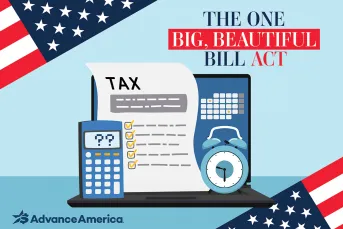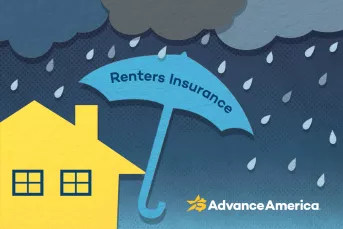

What Does It Mean When a Check Bounces? (And What to Do Next)
To steer clear of any consequences, you should never write a check unless you’re positive you have the funds in your account to pay for it. Here's how to avoid the potentially embarrassing situation of bouncing a check, and what to do if your check bounces.
What is a bounced check?
A bounced check is a check that can't be processed because the amount exceeds the funds in the checking account. The bank has no choice but to return – or “bounce” – the check. When this occurs, the bad check is returned unpaid to your bank, and you'll likely face non-sufficient funds (NSF) fees.
On the opposite end of the transaction, the person or business attempting to cash the check won’t receive their money. Since the check doesn’t bounce until it comes back to your bank, the recipient may not even know about it for a few days, leading them to think there’s more money in their account than there is. This could result in them overdrawing their account, and they may expect you to cover any overdraft fees in addition to the original check amount.
3 reasons a check bounces
1. Insufficient funds
Let’s say you write a check for $100 but you only have $80 in your account. That check will bounce because there isn’t enough money to cover the check amount. This is known as insufficient funds, also referred to as nonsufficient funds (NSF).
You should always double-check your account balance before writing any personal check.
>RELATED: Need Cash Now? 6 Ways To Find Cash
2. Written errors
To write a check correctly, you’ll need to include the date, the recipient’s name, the payment amount in numbers and words, and your signature. If you make any errors or forget any of this information on your check, it will likely bounce.
3. The check is old
Checks that are more than six months old are known as “stale-dated” and can’t be deposited. If a payee takes a long time to deposit your check, it’s likely to bounce.
What happens when a check bounces?
Now, let’s discuss what might happen if one of your checks does bounce:
Your payment doesn’t go through. When you bounce a check, the individual or company you wrote the check to will not receive the money you intended to give them. Your payment gets rejected and the check recipient may or may not reach out to let you know.
You could face fees. If your check bounces, you may be charged a returned check fee. Businesses typically charge this fee to deter customers from trying to pay with money they don’t have.
You might also owe a non-sufficient funds (NSF) fee to your bank, which can run you anywhere between $20 to $40 or a percentage of the check amount.
Your credit score may be impacted. If you tried to pay a bill with a check that bounces, you still owe that money. Your unpaid bill might be sent to collections if you fail to resolve the payment, and that can lead to your credit score taking a hit.
Your bank account may be reported. If you bounce checks often, your bank may report your account to a consumer reporting agency such as Equifax, TransUnion, and Experian, which tracks your deposit history. If this happens, you may have trouble opening bank accounts at other banking institutions.
What to do if you bounce a check
If you’ve bounced a check, you’ll want to do the following in a timely manner:
Contact the payee
Reach out to the person or business you wrote the check to immediately and let them know you don’t have sufficient funds to cover it. Although it’s no guarantee, being proactive and owning up to your mistake could make the payee more willing to work with you to fix the situation. If they haven't cashed the check yet, ask if they can hold the deposit until a later time.
Make a payment arrangement with the recipient
Work with the recipient to come up with a plan for how you’ll pay them. Consider options like covering the payment with a credit card, applying for a cash advance, or writing a new check when you get paid.
Pay the bank fees
If your bank charges fees for your bounced check, pay them. Don’t delay payment or ignore the fees. Doing so can put you in poor standing and damage your relationship with your bank.

6 ways to avoid bouncing a check
Now that you know what to do if you bounce a check, here are some helpful ways to avoid bouncing a check at all.
1. Keep track of your account balance
Check your account balance on a daily or weekly basis so you know how much money is in your account at all times. You can also sign up to receive alerts whenever your balance dips below a certain threshold.
2. Get overdraft protection
If you enroll in overdraft protection through your bank, your checks will go through even if you don’t have sufficient funds in your account. But, if you choose this option, be aware you’ll probably be responsible for the overdraft fees.
3. Track your bill payments
Before writing a check, it’s important to factor in any other checks or automatic payments that might be pending. Keeping a list of your bills, including the payment dates and amounts, can help you avoid any unpleasant surprises.
4. Save extra money in your account
It’s always a good idea to leave some extra money in your account. Even an extra $50 to $100 can save you from the financial and potential legal consequences of bouncing a check.
5. Pay with a debit card
If you’re unsure about whether you have enough money to cover a check, try paying with a debit card. If you haven’t signed up for overdraft protection and you don’t have enough funds in your account, your card will automatically get rejected.
6. Consider emergency loan options
In some cases, applying for an emergency loan might be more cost-effective than dealing with NSF fees and late payment fees. Here are some quick and easy cash advance loan options you might consider:
Installment Loan
An Installment Loan provides you with a lump sum of money upfront. Then, you pay it back over time through fixed monthly payments, or installments.
Line of Credit
A Line of Credit works kind of like a credit card in that you’re approved for a maximum borrowing amount and can withdraw any amount you need at any time (up to your credit limit). Plus, you’ll only pay interest on the amount you borrow, which makes this a flexible option to have on hand if a check ever bounces.
Bounced check FAQs
Is it illegal to bounce a check?
It’s not illegal to unintentionally bounce a check. Accidents do happen, after all. However, there may be legal consequences depending on the situation and if it can be proved there was intent.
For example, if you knowingly write a bad check to defraud someone, that is considered check fraud. Additionally, if you have a pattern of writing bad checks, you could be charged with a crime and face jail time.
How can I tell if my check bounced?
Keep an eye on your bank statement for any new fees. When a check bounces, these fees might be listed as “return fees” or “NSF fees.”
You can also contact your bank or your check recipient to find out its status. If you think a personal check you wrote might bounce, you can try contacting the payee to see if they’ll accept an alternate payment method before they try to cash the check.
Will my bank notify me if my check bounces?
Banks aren’t required to notify you if your check bounces due to insufficient funds. If you’re worried that a check you wrote might bounce, keep an eye on your bank account for unusual fees.
Get the money you need to prevent a bounced check
Finding yourself in an unfortunate financial situation isn’t easy. Not only can a bounced check result in excess fees you might not be able to afford, but it can also lead to embarrassment. There are same-day and next-day loan options available that can provide you with the money you need quickly, regardless of your credit.
Apply for a loan online today at Advance America.
Notice: Information provided in this article is for informational purposes only. Consult your attorney or financial advisor about your financial circumstances.


